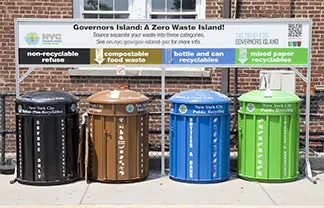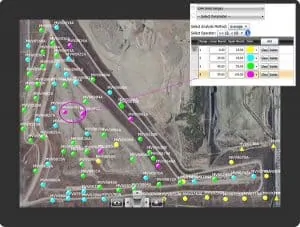

Breweries under SIC code 2082 (malt beverages) are required to sign up for the new California stormwater permit, under the State Water Resources Control Board. That permit went into effect a year ago. To this point, enforcement has been slow but there are indications that enforcement will increase in 2017.
The mandatory minimum penalty for non-filing starts at $5,000 and can increase substantially under the Clean Water Act for discharges that do not meet state water quality standards. In addition, based on recent experience, there is considerable risk of lawsuits brought by environmental groups or others. More than 120 suits have been filed this year. In either case, this is not an issue you should ignore.rewpubs are likely exempt (based on SIC code), our analysis of available public data indicates that 129 of the 600 or so breweries that should sign up for the permit have done so or around 20%. Hat’s off to our brethren who have complied!
Based on SIC code brewpubs are likely exempt; our analysis of available public data indicates that 129 of the 600 breweries that should sign up for the permit have done so. Hat’s off to our brethren who have complied!
And 117 of the 129 have submitted No Exposure Certifications. This certification process is quite straight forward and includes a checklist that, in a nutshell, states that no operations or storage of spent grain or yeast are outdoors and uncovered (i.e. all raw and intermediate products must be covered and sealed when moved into and out of the facility).
That leaves over 400 breweries at risk.
If you aren’t sure whether you’re required to comply with the stormwater permit or aren’t sure what to do, stop by the SCS Engineers booth (#10) at the CCBA Fall Conference in California for advice.
CONTACT YOUR LOCAL SCS ENGINEERS’ OFFICE IN YOUR STATE
We can also help you with other water issues including flood control site drainage, water treatment options, water recycling, and using groundwater to reduce your reliance on City or water district supplies.
CCBA Fall 2016 Conference
November 13, 2016 – November 15, 2016
Oakland Scottish Rite Center
1547 Lakeside Dr.
Oakland, CA 94612
Cory Jones, QISP
Stormwater Manager
858-571-5500
SCS Engineers was selected to provide on-call services for capital improvement projects at the Riverside Regional Water Quality Control Plant (RWQCP) and the Tequesquite Landfill for the City of Riverside Public Works Department.

SCS Engineers provides wastewater planning, compliance, and engineering services for capital improvement projects at the Riverside Regional Water Quality Control Plant and the Tequesquite Landfill for the City of Riverside Public Works Department.
Over the next three years, SCS will provide wastewater planning and engineering services; geotechnical and materials testing; specialty inspection, including concrete, structural steel, electrical, welding, instrumentation, high voltage inspection services, and other optional construction inspections; PLC programming services; landfill studies, remediation and monitoring; air quality testing and compliance services; as well as regulatory and environmental compliance services.
“SCS Engineers is excited to be a part of the RWQCP plant expansion that will ensure the City of Riverside complies with current state and federal regulations,” said Pat Sullivan, Sr. Vice President with SCS Engineers. “We look forward to assisting RWQCP and the Tequesquite Landfill meet the growing needs of their community.”

Read the full article by Marc Rogoff, SCS Engineers.
Article in Waste360: explains who’s impacted and how to begin managing the costs.
SCS Technical Bulletin: a digest of hundreds of EPA regulatory policy into the information and timelines to act on now.
Article: strategic financial planning to support infrastructure costs.
Call our compliance specialists – find the office nearest you or email us at
A solid waste rate analysis will provide your agency with a deeper understanding of how to establish rates and appropriately allocate costs to the various functions of your operation. This financial analysis can also be used to estimate and plan for various contingencies year-by-year.
For example, if your agency would like to buy new collection vehicles or expand your landfill or recycling center, a rate study will allow you to assess how the purchase would impact your current budget. You can then determine if you will have adequate surpluses during the fiscal year to procure these items or if a rate adjustment might be necessary at some point.
Importantly, if the final recommendation of the rate study is a rate increase, you will be armed with information that will strengthen your case when requesting a fee increase.
Read and share this newly published article by Marc J. Rogoff, Ph.D., and Laurel Urena, M.S., E.I.T., of SCS Engineers. Learn more about this valuable service at SCS Engineers and see how others are using rate analysis.
Read and share the full article
Learn more about Rate Analysis
Read how one organization used rate analysis as part of their solid waste master plan
SCSeTools® gives you the ability to instantly map air leaks, vacuum distribution, wells that are “over pulling” and wells that are underutilized – valuable tools for every wellfield technician to maximize system performance beyond simple compliance tracking and reactive wellhead tuning.
As a field technician, you walk a fine line – tuning to a threshold, pulling as hard as you can, as safe as you can. When important data factors start to wander you need to troubleshoot quickly to keep collecting as much as gas as possible without over compensating and adjusting wellheads multiple times. SCSeTools® makes troubleshooting faster and more efficient by turning your data into maps identifying important conditions in the field and the wellheads that need tuning. Field technicians know how to balance the wellfield without killing bacteria and without diluting the gas.
A map of your field with your specific tuning range quickly shows data that are typically missed in reams of data. SCSeTools alerts you to these indicators using a map of each wellhead in the wellfield. Where you formerly needed months for these changes to become apparent, SCSeTools tells you at the touch of a button when a change began occurring and which wellheads are impacted. As a technician you know what you need to tune and which wellheads need your attention.

Using SCSeTools pick any parameter that the GEM collects and create custom ranges or use specified guidelines to quickly identify trends throughout the landfill. Tuning ranges can be adjusted to specific conditions found at individual landfills. Smooth a saw tooth collection pattern and learn from your data for maximum vacuum and maximum collection without risk.
Last year Tom Barham, SCS Engineers’ General Counsel and Field Services Construction Director made headlines at SCS with his admission to the United States Supreme Court Bar. We are extremely proud of Tom!
This month Tom had the opportunity to have lunch with Supreme Court Justice Ruth Bader Ginsburg as part of a fireside chat sponsored by the Association of Corporate Counsel. The discussion was led by Ted Olsen, a former Solicitor General of the United States who has argued 62 cases before the Supreme Court.
Justice Ginsburg was remarkably open and candid about her career and generous with her advice, including sharing advice from her mother in law on how to have a successful marriage, which she noted as “the best advice she ever received.”
As a pioneer in women’s rights and civil rights in America, Justice Ginsburg was involved in many important cases as an advocate and a judge. Asked about which cases stood out, she recalled a case challenging Virginia Military Institute’s (VMI) male only cadet policy. She noted that this was one case Mr. Olsen lost 7-1 and the one vote he got was from Justice Scalia who was already was on VMI’s side and needed no more advocacy to secure his opinion. (According to Mr. Olsen, RBG is known for her “wicked sense of humor”.) The case was memorable not for its legal precedent, but because of correspondence from the family of a female cadet. The female cadet’s father, a Marine and VMI graduate, wrote Justice Ginsburg to thank her for helping to create the opportunity for his daughter to attend VMI.
Subsequently, another letter from the daughter arrived with a Keydet pin which the daughter received upon graduation. The pin traditionally is given to the mother of the graduate, but since the cadet’s mother passed away before her graduation, the cadet sent it to Justice Ginsburg explaining that the Justice was like the grandmother to her and all future generations of female cadets. Justice Ginsburg keeps the letter and pin on her desk at the Supreme Court.
On how to have a successful marriage, Justice Ginsberg’s mother in law advised that it is best sometimes to be deaf to things you don’t want to hear, and handed her a pack of earplugs. Justice Ginsburg explained she has found that advice very helpful, choosing to be deaf to unpleasant things sometimes said.
“When you think about it, it was remarkable to have an opportunity to have lunch with a sitting Supreme Court Justice,” said Tom. “I even had an opportunity to ask for her advice on teaching fundamentals of the Constitution and our legal system to the international students in the class I teach in the University of Maryland Graduate School of Civil Engineering. Maybe I can get The Notorious RBG to guest lecture next semester?”
About Tom Barham
Mr. Barham is SCS Engineers General Counsel and Senior Vice President of Construction Services. He is a member of the Virginia and District of Columbia bars, and holds a degree in building construction. He has over 30 years of experience in construction and construction law.
Mr. Barham provides SCS Field Services with expertise in construction management, including procurement, scheduling, budgeting, and estimating, as well as other contract formation and administration activities.
Mr. Barham has directed several full service (design/build) projects and has been involved in numerous projects such as Landfill Gas (LFG) collection systems (blower/flare stations, extraction wells, horizontal collection trenches, header lines, and condensate collecting/containment systems); groundwater pump and treat systems (stripping towers, recharge galleries, groundwater wells, deep recharge wells, collection/distribution piping, and pump stations); bio-treatment facilities (containment areas, moisture/nutrient application, and soil mixing); underground storage tanks (excavation, testing, triple rinse, and restoration); soil vapor extraction systems (cat/ox treatment facilities, vapor extraction wells, collection header lines, and air make-up wells).
By Bruce J. Clark, SCS Engineers
In 2015, the City of Miami Beach Public Works Department took the initiative to raise about 4,200 feet of asphalt streets. It’s also implementing a master plan developed in 2014 to protect the homes and livelihoods of 88,000 residents and $50 million in taxes.
Several U.S. cities are exploring how global climate trends could affect local infrastructure, but Miami Beach is the nation’s first city to face the reality of rising sea levels. Consequently, the city is providing others with unique insight. In the words of City Engineer Bruce Mowry, “There’s no playbook for these solutions.”
For years, Wisconsin landfills have relied on compliance with the storm water (stormwater) management requirements in the Chapter NR 500 code series to achieve compliance with the NR 216 storm water standards. Effective June 15, 2016, the Wisconsin Department of Natural Resources (WDNR) changed their policy, and now requires landfills and associated non-commercial borrow sites to obtain separate industrial storm water permit coverage.
Read the SCS Engineers Technical Bulletin to determine what action you may be required to take and by what date.
If you have questions or need help filing or developing a plan, please contact:
Betsy Powers, PE
(608) 216-7347
Sherren Clark, PE, PG
(608) 216-7323
…and as waste settles, it can have an effect on equipment,” according to Pat Sullivan of SCS Engineers in this ClimateWire article. As the U.S. EPA focuses on pushing landfill owners into cutting down on methane emissions some worry that a combination of tightening regulations and poor cost analysis might put some smaller landfills out of business.
LANDFILL EMISSIONS: Going to the dump? You might make electricity
Kavya Balaraman, E&E reporter
Reprinted from ClimateWire with permission from E&E Publishing, LLC. Copyright 2016.